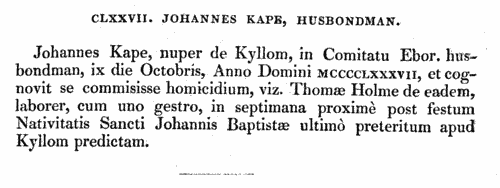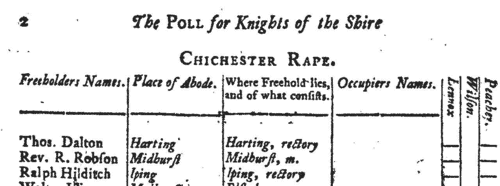Logg Surname Ancestry ResultsOur indexes 1000-1999 include entries for the spelling 'logg'. In the period you have requested, we have the following 16 records (displaying 1 to 10): Buy all | | | Get all 16 records to view, to save and print for £86.00 |
These sample scans are from the original record. You will get scans of the full pages or articles where the surname you searched for has been found. Your web browser may prevent the sample windows from opening; in this case please change your browser settings to allow pop-up windows from this site. Murderers sheltering in Beverley Minster: and their victims
(1478-1539)
Criminals could evade pursuit by claiming sanctuary in the church of St John in Beverley, in the East Riding of Yorkshire. This liberty of the minster extended a league in every direction from the church door, and was divided into six sections, each giving greater sanctity to the rights of sanctuary, the sixth and innermost section being the presbitery or chancel. Near the altar there was a stone chair called the Frith Stool, seated on which an accused could claim total immunity. The bailiff would receive the oath of the fugitive, and a clerk recorded 'what man he killed, and wher with, and both ther namez'; the bailiff receiving a fee of 2s 4d, the clerk 4d. Sanctuary was afforded for 30 days, with food and lodging, after which the fugitive was protected to the borders of the county. But within 40 days he had to appear before the coroner, clothed in sackcloth, and be branded on his right hand with the sign of the letter A. This signified that he was swearing to abjure the realm: he was then free to leave the country unhindered. At Beverley the clerks kept a separate register of fugitives' petitions, which survives from 1478 to 1539 in Harleian Manuscript 560. It was edited and printed by the Surtees Society in 1837 under the title Sanctuarium Beverlacense. Some of the criminals came from a considerable distance: the great majority were murderers or homicides. Each entry usually gives full name, original address, (often) trade, a brief description of the crime, often with date, and usually the name of the victim. This index covers all the surnames given.LOGG. Cost: £4.00.  | Sample scan, click to enlarge

|  Masters and Apprentices
(1714) Masters and Apprentices
(1714)
Apprenticeship indentures and clerks' articles were subject to a 6d or 12d per pound stamp duty: the registers of the payments usually give the master's trade, address, and occupation, and the apprentice's father's name and address, as well as details of the date and length of the apprenticeship. 12 April to 31 December 1714.LOGG. Cost: £8.00.  | Sample scan, click to enlarge

|  Apprentices registered at Exeter in Devon
(1720-1723) Apprentices registered at Exeter in Devon
(1720-1723)
Apprenticeship indentures and clerks' articles were subject to a 6d or 12d per pound stamp duty: the registers of the payments usually give the master's trade, address, and occupation, and the apprentice's father's name and address, as well as details of the date and length of the apprenticeship. There are central registers for collections of the stamp duty in London, as well as returns from collectors in the provinces. These collectors generally received duty just from their own county, but sometimes from further afield. Because of the delay before some collectors made their returns, this register includes indentures and articles from as early as 1719. (The sample entry shown on this scan is taken from a Norfolk return)LOGG. Cost: £8.00.  | Sample scan, click to enlarge

|  Apprentices and trainee clerks
(1763) Apprentices and trainee clerks
(1763)
Apprenticeship indentures and clerks' articles were subject to a 6d or 12d per pound stamp duty (late payment of the 6d rate attracted double duty (D D) of 12d): the registers of the payments usually give the master's trade, address, and occupation, and the apprentice's name, as well as details of the date and length of the apprenticeship. 1 January to 9 December 1763.LOGG. Cost: £8.00.  | Sample scan, click to enlarge

| Occupiers of freeholds in Chichester rape, Sussex
(1774)
A poll of freeholders to elect two knights of the shire to represent the county of Sussex was taken at Chichester in 1774. This poll book lists each voter's full name; abode; where the freehold lay and of what it consisted (b., barn; f., farm; g., garden; h., house; l., land; m., mill; o., orchard; r., rectory; w. sh., workshop); and the name of the occupier (if any) (often surname only); with dashes in the right-hand columns indicating votes for the candidates, Lord George Henry Lennox, sir Thomas Spencer Wilson and sir James Peachey. The franchise was limited to freeholders of 40 shillings per annum and more. The sample scan shows part of Chichester rape. The rape of Chichester included Midhurst and the surrounding countryside.LOGG. Cost: £6.00.  | Sample scan, click to enlarge

|  Apprentices
(1775) Apprentices
(1775)
Apprenticeship indentures and clerks' articles were subject to a 6d or 12d per pound stamp duty: the registers of the payments usually give the master's trade, address, and occupation, and the apprentice's name, as well as details of the date and length of the apprenticeship. 1 January to 31 December 1775.LOGG. Cost: £8.00.  | Sample scan, click to enlarge

| Glasgow Directory
(1835)
'The Post-Office Annual Directory For 1835-56: Containing An Alphabetical List of the Merchants, Traders, Manufacturers, and Principal Inhabitants: And A Second List of the Names of Merchants, Manufacturers and Traders, in Glasgow and Suburbs, Classed and Arranged under Each Distinct Head of Trade or Profession with A Street Directory: And An Appendix, Containing Many Useful Lists' was published in Glasgow in 1835. This main alphabetical section is from page 21 to 253, and comprises about 11,000 entries.LOGG. Cost: £4.00.  | Sample scan, click to enlarge

| Long-stay Paupers in Workhouses: Barwick in Elmet
(1861)
This comprehensive return by the Poor Law Board for England and Wales in July 1861 revealed that of the 67,800 paupers aged 16 or over, exclusive of vagrants, then in the Board's workhouses, 14,216 (6,569 men, 7,647 women) had been inmates for a continuous period of five years and upwards. The return lists all these long-stay inmates from each of the 626 workhouses that had been existence for five years and more, giving full name; the amount of time that each had been in the workhouse (years and months); the reason assigned why the pauper in each case was unable to sustain himself or herself; and whether or not the pauper had been brought up in a district or workhouse school (very few had). The commonest reasons given for this long stay in the workhouse were: old age and infirm (3,331); infirm (2,565); idiot (1,565); weak mind (1,026); imbecile (997); and illness (493). LOGG. Cost: £6.00.  | Sample scan, click to enlarge

| Boys at University College School
(1860-1900)
In 1830 a school was set up adjoining the University and College of London on Gower Street; the school was enlarged from 1860 to 1876, and then removed to Frognal in 1907. In 1931 this register was published, listing all boys entering the school from Christmas term of 1859 to the summer entrants of 1931. The dates are abbreviated (98-01 = 1898-1901, &c.), each session being reckoned as beginning in September of one year and ending in the July of the next; the date of joining the school is indicated by the former, although it may fall in the latter, but the date of leaving by the latter, although it may fall in the former. Thus, if a boy came at any time during the Session 1863-64 and left any time during 1868-69, his date would be given 1863-69. The boys are listed alphabetically by surname, and then chronologically under each surname, full name being given where known. An asterisk * indicates that that particular boy lost his life in the Great War: in these cases, rank and regiment have been given where possible. Addresses as of 1931 are given where known. Italics in christian names or initials indicate that that particular boy was known, in 1931, to be dead. (a) (b) &c placed before christian names indicates brothers. In some cases occupation in later life is shown (A, artist; B, barrister; C A, chartered accountant; Ch, chemist; E, engineer; H C S, home civil service; I C S, Indian civil service; Med, physician or surgeon; M S E, member of the Stock Exchange; Mus, musician; Rev, minister of religion; S, solicitor). This is the index to those boys who were at the school in the period 1860 to 1900.LOGG. Cost: £4.00.  | Sample scan, click to enlarge

| Unclaimed Naval Prize Money
(1855-1902)
Various prize moneys were awarded to officers and men who served on board her Majesty's ships. For one reason or another a substantial number of these prizes, from as little as a shilling or two to as much as many pounds, remained undistributed by 1902, when this comprehensive list of the unclaimed moneys was printed: it lists unclaimed shares of prize money, slave and pirate bounties, salvage awards, parliamentary grants, gratuities and other moneys distributed by the Admiralty 1855 to 1902, but which omits moneys for service on the China Station during the war of 1856 to 1880, and special gratuities for service in Egypt (1882), Soudan (1884) and Soudan and Nile Expedition (1884-1885), for which there are separate indexes. In each case the sailor's name is given first (surname, then christian name or initials); rank or rating; ship in which serving at time of capture or award; and the amount due.LOGG. Cost: £6.00.  | Sample scan, click to enlarge

|
| 1 | 2 |  |
Research your ancestry, family history, genealogy and one-name study by direct access to original records and archives indexed by surname.
|













